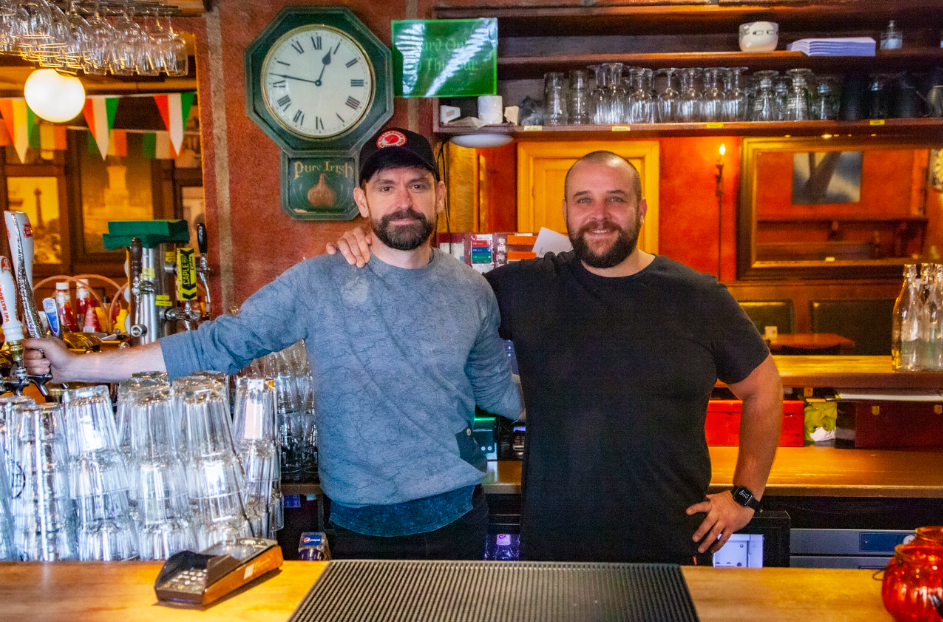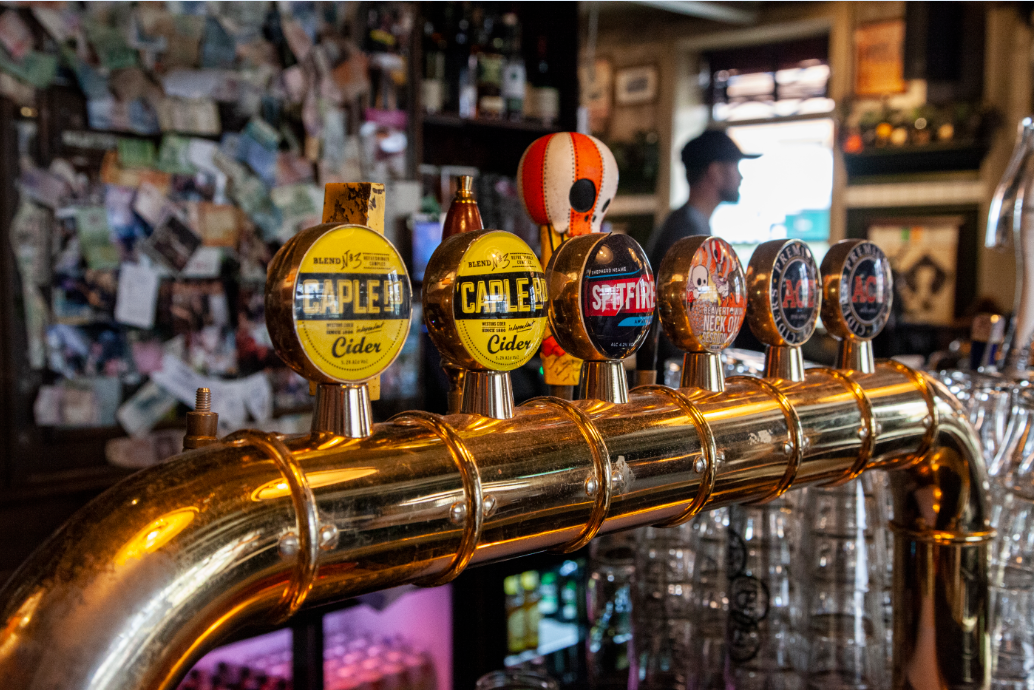Member portrait: The Dubliner
The Irish and British bar culture is in the walls. Who you are and where you come from, it doesn't matter. At the brown bar counter you will feel right at home - in the middle of Norway's capital .
The facade and sign of The Dubliner in Rådhusgata
Since opening its doors in 1996, The Dubliner has been a fixture in Oslo's pub scene. We spoke to general manager Pete Nic and head chef Neil Swart.
The staff means everything!
General manager Pete Nic and head chef Neil Swart behind the bar.
“It’s not quite the same here as other pubs,” says head chef Neil. “At The Dubliner, the crew is everything. The staff here have to understand real pub culture.” “I look for the right personality when I hire new people,” says general manager Pete. “We want the pub to be an extension of the guests’ own living room.” Here, guests can always come to the bar and strike up a conversation with the bartender. Those who work here have to be able to take the initiative to start conversations themselves, and they have to enjoy being with the guests. “That’s what pub culture is all about!” says Pete. “Several of the staff have been regular customers with us for a long time, and have gradually worked their way into what we call “our family.” This is a business with a lot of personal commitment, we are our own small community. Maybe that’s why we have a low staff turnover,” smiles the general manager.
Authentic pub experience
At The Dubliner you can come as you are, there is no dress code. Pete says jokingly: “I discuss this with our security guards: they wear white shirts, and I ask them to change, because they are the best dressed people in the pub!” he laughs. “It is important that people feel comfortable. Maybe you pop a beer or have a glass of wine when you get home from work. – That is what we want you as a guest to think: Come to the pub and have that beer with us!” – And the resemblance to a real, British or Irish pub is as close as you can get. The food at The Dubliner is unpretentious, made to taste good, and the atmosphere is relaxed. The biggest compliment the staff here can get is that the guest feels like they are in their own home. “But it can also be a real ‘heels-in-the-roof’ atmosphere here when the band on stage starts on Saturday night,” says Neil. "We mostly serve beer or two-ingredient drinks. The only cocktail-like drink you'll find here is our Irish coffee. But we take a lot of pride and honor in giving this drink what it deserves!" says the head chef. "Of course, we use real whipped cream. When we recently changed coffee suppliers, it was most important to find a coffee with the qualities that work in our Irish!"
A place for everyone
“ The Dubliner should be an extension
of the guest's own living room. What happens
at the Dubliner, stay at The Dubliner!
"
The restaurant offers slightly different experiences on the premises. People often come in groups with different requirements and needs. In the newer whiskey bar there is a more refined style. Here guests can explore cocktails and over 500 different whiskey varieties. The bartenders here are driven and experienced. Here you will get the best whiskey sour in town! In the more traditional pub, guests can enjoy live music. There are also quieter bar areas for business groups, dates and groups of friends.
“We also have a sports bar with shuffleboard and big TV screens,” says Pete. “There, grown men can cry and get all worked up for their favorite team.” The Dubliner also has a unique backyard. The inner backyard is a large smoking area, and it has been important to the regulars here. “Part of the pub experience is the movement you make in the place during the evening,” says Pete. You might start with a beer, or have a drink in the cocktail bar, you have a nice dinner. At 5 o’clock there might be a football game that you want to see. At 8 o’clock, a band is on stage, and the place changes character. Then you find yourself on the dance floor, maybe meet a girl there, and then you end up in the bar. The place changes from being a restaurant and pub, to a night club and concert venue in the evening, - and a bit of a “nightclub”? Pete points to the floor in front of the stage: “In the evening, we just call this area ‘the moshpit,’” he says, laughing.
Guests as driving force
Most of the bands that play here are brought in from Ireland. On the floor above the bar there is a separate apartment where the bands live during the period they play here. Many of the musicians return year after year, and become part of the pub family. Many of the regulars have also made direct contact with the band members. “The great thing about this bar is that things often happen around us,” says the general manager. “Guests have started scrabble clubs and knitting clubs with us on their own initiative. We also have a good tone with our guests on social media,” says Pete. “Guests are our close friends! Our Facebook page works as a kind of “community group”. When we were closed during the pandemic, we contributed with nice greetings and we streamed live concerts, to give our friends that little extra.”
The best Norwegian ingredients
“We prefer to have Irish, British or Scottish drinks, preferably on tap,” says Neil, “but there are also a lot of good Norwegian beers on the market.” With 80% of Norwegian guests, and when 90% of the earnings go to beer sales, the restaurant has to offer beers that Norwegians like. The crew has tasted a number of Norwegian lagers. The choice fell on a beer that goes well with the pub dishes on the menu. “The food we serve is basic, but quality is important,” emphasizes Neil. “The trick is to have simple food that is made well, where the ingredients play the main role.” The chef emphasizes that it is actually quite challenging to get the same dish to maintain the same quality for years, with constant changes in staff and products. Then it is important to maintain continuity and quality and keep the supplier line going as far as possible.
Supplier to trust
“The great thing about Oslo is that it is so small, we know most of the drivers and the contact persons at the wholesaler,” says the chef. “Of course there are challenges when the supplier has run out of goods, or misunderstandings arise, but we have very good communication. The wholesaler we use also has a very good ordering solution that is easy to use. The most important thing for us is still the personal contact we get with those who come here with the goods. For us it means a lot that it is the same drivers who come every time, and that they care about us who run the place. It is also an advantage not to have to constantly explain to new drivers the winding roads into our warehouses, when we have other things in our hands.”
Traditional bar in new times
Although The Dubliner is not a place that constantly expands its menu, the staff likes to try out new ideas and products. “Even though we run a traditional pub, it’s important to have a dynamic culture,” says Pete. “Since we have such a high turnover here, we find that The Dubliner is a place where new products are easy to expose to the Norwegian market. When 1664 Blanc was launched a couple of years ago, we had barely heard of it in this country, before we started pushing it here. Soon we were seeing it all over Oslo.”
Like many other businesses, The Dubliner has had to think new and infection-friendly in the last couple of years. QR codes quickly spread around the tables. “Digital orders are convenient and easy for our customers, especially when ordering food,” says the general manager. “For us, it is still important to have drinks served at the bar, otherwise we lose the dynamism a bar should have. The unique, intimate pub culture will always come first at The Dubliner.”
The Dubliner was built by enthusiasts, and it shows! All the furnishings, from bar counters and taps to old church pews, are imported from the UK and Ireland.
Under the NoHo umbrella
The Dubliner is owned and operated by the nightlife operator NoHo, which acts as a support and operational aid for the pub. NoHo Norway currently operates 20 venues across the country, each with its own unique characteristics. They collaborate on events, and together they get access to good purchasing offers and services. Here, every venue can run their concept, and at the same time be part of a larger community.







